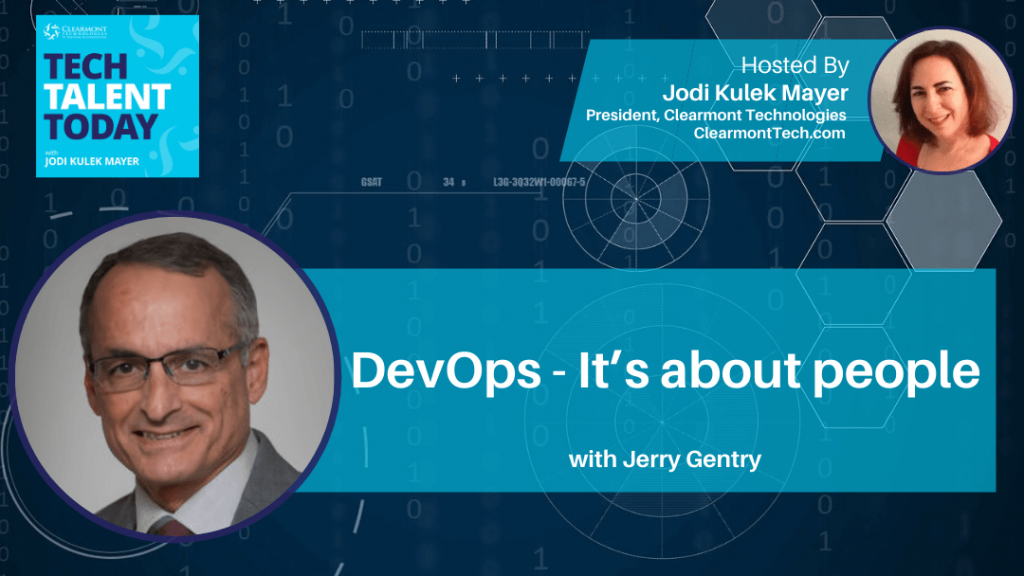I’m excited to be joined on this episode of Tech Talent Today by Jerry Gentry, Senior Director of Enterprise Architecture and Engineering for a public utility. Jerry is a proven leader who’s a catalyst for transformation. He has a history of problem solving and innovation while maintaining stability and achieving business outcomes. I know you’ll learn a lot from his experience.
You will want to hear this episode if you are interested in…
- Jerry’s experience with DevOps [01:49]
- It’s about people, not technology [09:33]
- Constantly reflecting and improving [14:12]
- Jerry’s hiring philosophy [20:44]
- Connecting with people remotely [27:05]
- Running, cycling, and music [32:59]
- Writing “Syn:Fin” [37:22]
Collaborating development with operations
When integrating a pipeline to do software development, there are a lot of logical aspects that need to be taken into consideration. Little details can seem trivial at first but become problematic long-term. DevOps starts with building consistency in application development, then they take that and move it to operations. The link between development and operations becomes vital.
There was a time when development and operations tried to function separately and hoped for good commentary and documentation. In a DevOps environment, people involved in engineering are asked to participate in the operation side and vice versa. That way, before something goes into production, the operations people have already used it and understand the assumptions being made underneath it. There are always assumptions when engineering anything, and it’s best to make those evident to everyone.
Learning and leading
Even in a repetitive job, there are opportunities to learn new things. That’s always been part of Jerry’s nature. In any position, he tries to understand more about either the industry, how to do his job better, or the current trends. He pays extra attention to people trying to fix their problems right now because those are the people trying to innovate. Those are the situations where Jerry finds potential leaders.
The first part of any leadership role for Jerry is putting his own preferences and ideas in the background and talking to the people in the business. Rather than making big changes immediately, he makes only a few tweaks here and there as necessary. Typically it will take three to six months to figure out how things work best. Taking the time to understand the culture is important before making any changes to it.
Just start writing
Jerry had always been curious about writing. He had gotten tired of reading tech fiction where the technology was all wrong and decided to write something himself. Jerry took real-life events and started thinking about what would happen if various things happened. He started writing every day, and after a while, he had written a book!
The key to writing code or writing a book is persistence. We have to recognize that we’re not going to be good at it at the start. We simply have to start writing. Jerry’s theory is that writer’s block is the writer waiting for correctness to come. What helped him get over writer’s block was to buy a manual typewriter. He put it on the table and just started typing. Once the first paragraph comes out, the rest just happens. The next thing you know, you have a good story.
Agile and DevOps are a mindset, as well as methodologies and tools. #DevOps #Agile Share on XResources & People Mentioned
- What is a CI/CD pipeline?
- The Toyota Way, Second Edition
- SYSTEMANTICS. THE SYSTEMS BIBLE
- Failure Is Not an Option: Mission Control from Mercury to Apollo 13 and Beyond
- Syn:Fin
Connect with Jerry Gentry
- On Linkedin
Connect With Jodi Kulek Mayer
- https://clearmonttech.com/about/meet-the-team/
- Follow Jodi on LinkedIn
Subscribe to Tech Talent Today on
Apple Podcasts, Spotify, Google Podcasts
Audio Production and Show notes by
PODCAST FAST TRACK
https://www.podcastfasttrack.com

